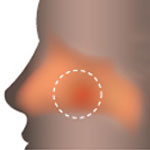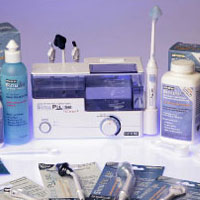 Allergies, asthma, sinusitis, and nasal polyps often go together, and people afflicted by any one of these should know the links between them. The symptoms that you attribute to allergies or a chronic sinus infection could in fact be caused by small growths on the lining of your sinuses or nose. If your nose drips continuously, it’s hard for you to breathe, and your sense of smell seems weaker than it was, nasal polyps could be the reason.
Allergies, asthma, sinusitis, and nasal polyps often go together, and people afflicted by any one of these should know the links between them. The symptoms that you attribute to allergies or a chronic sinus infection could in fact be caused by small growths on the lining of your sinuses or nose. If your nose drips continuously, it’s hard for you to breathe, and your sense of smell seems weaker than it was, nasal polyps could be the reason.
What are Nasal Polyps?
Nasal polyps are not a disease. So what causes nasal polyps? They occur when prolonged inflammation of nasal passages causes the blood vessels lining the nose and sinuses to become permeable. As a result, water accumulates in the cells, gravity tugs on the waterlogged tissues, and polyps develop.
Nasal polyps are soft, benign growths that develop in the mucous lining of the nose or sinuses. They can be present either singly or in multiples that are clustered together and look like a bunch of grapes. Nasal polyps are soft and pearl-colored with a consistency similar to jelly.
Small nasal polyps don’t cause many problems, but it’s possible for larger ones to block your nasal passages. This can impact your breathing and diminish your sense of smell. They are also sometimes responsible for dull headaches and snoring. In severe instances, extremely large nasal polyps can alter face shape.
Symptoms of Nasal Polyps
Nasal polyps, especially small ones, do not always cause symptoms. When they do, symptoms of nasal polyps may be confused with symptoms of allergies, asthma, and sinusitis (which may also lead to polyps).
Small polyps may not cause any problems, but larger ones can. Often, people are alerted to the presence of nasal polyps when it becomes difficult to breathe, they suffer from a constantly dripping nose, and their sense of smell decreases. Below are some signs and symptoms of nasal polyps:
- Runny nose
- Persistent stuffiness
- Chronic sinus infections
- Loss or diminishment of sense of smell
- Dull headaches
- Snoring
- Nasal obstruction
- Anosmia (absence of sense of smell)
- Sensation of fullness in the face
- Nasal discharge
- Shortness of breath
Because nasal polyps can often grow through the tunnel that connects the sinuses to the nose, the result is often a blocked nose. A blocked nose clearly makes it difficult to breathe through the nose; in this way, nasal polyps can lead to mouth breathing, which is not good for those suffering from asthma, especially if the weather is cold. More importantly, nasal polyps can block the tunnels connecting the nose to the sinus cavities. This causes the accumulation of fluid in the sinuses, which often leads to sinus infections.
Who’s at Risk for Nasal Polyps?
Any condition that causes chronic inflammation in the nose or sinuses – such as cystic fibrosis, allergic fungal sinusitis, or chronic sinus infections – puts a person at risk for developing nasal polyps. Conversely, the discovery of nasal polyps can lead to the diagnosis and eventual treatment of some of these conditions.
Those with sensitivities to aspirin or to nonsteroidal anti-inflammatories (like ibuprofen and naproxen) are also more likely to get polyps. It’s very important that people with nasal polyps and asthma don’t take aspirin because they could have a potentially life-threatening sensitivity to aspirin. The combination of these three factors – nasal polyps, asthma, and sensitivity to aspirin – is known alternatively as the aspirin triad, Francis triad, or Samter’s syndrome.
Age is also a factor in the development of nasal polyps, which are much more likely to show up in those over 40. Children under 16 who exhibit nasal polyps should be tested for cystic fibrosis. Furthermore, children with nasal polyps and hay fever are also recommended to get allergy skin testing in order to ascertain what other allergic sensitivities they may have.
John E. McClay, MD, of the Department of Otolaryngology at the University of Texas at Southwestern lists the following conditions as being associated with multiple benign polyps:
- Bronchial asthma – polpys in 20-50% of patients
- Cystic fibrosis – polyps in 6%-48% of patients
- Allergic rhinitis
- Allergic fungal sinusitis – polyps in 85% of patients
- Chronic rhinosinusitis
- Primary ciliary dyskinesia
- Aspirin intolerance – in 8%-26% of patients with polyps
- Alcohol intolerance -in 50% of patients with nasal polyps
- Churg-Strauss syndrome (a rare disease that causes inflammation of the blood vessels) – nasal polyps in 50% of patients
- Young syndrome (characterized by chronic sinusitis, nasal polyposis, and azoospermia)
- Nonallergic rhinitis with eosinophilia syndrome (NARES) – Nasal polyps in 20% of patients with NARES
Causes of Nasal Polyps
Otolaryngologist John E. McClay, MD, states, “Most theories consider polyps to be the ultimate manifestation of chronic inflammation; therefore, conditions leading to chronic inflammation in the nasal cavity can lead to nasal polyps.”
The two most common causes of nasal polyps are allergies and chronic sinus infections. They are also associated with asthma, which can flare up because of nasal polyps.
Although the exact cause of nasal polyps is unknown, we do know that inflammation in the sinuses, like that caused by allergies or infection, may trigger polyps and make them grow faster. A genetic predisposition to develop nasal polyps is possible, but again, not known. Additionally, an allergic response to fungus that is normally present within the nose may be the cause of nasal polyps in some patients. This is seen by the fact that about 30% of patients seem to respond to a nasal spray containing an antifungal medication.
Preventing Nasal Polyps by Treating Underlying Conditions
Often, nasal polyps can’t be prevented. However, for those who suffer from asthma, allergies, or chronic sinus infections, managing symptoms reduces nasal congestion and trouble breathing. Such management includes avoiding indoor and outdoor allergens and pollutants.
Medications to control allergies or sinus infections, antihistamines or antibiotics, are often useful in inhibiting the formation of nasal polyps.
 Irrigating the sinuses with salt water helps relieve mild nasal congestion and eliminate mucous. Nasal saline irrigation is a key component of preventing nasal polyps and of managing them if they do develop. There are many nasal saline irrigation products available, including the SinuPulse Elite and the Narial Nasal Cup Neti Pot, which facilitate the irrigation and gentle cleansing of the nasal passages.
Irrigating the sinuses with salt water helps relieve mild nasal congestion and eliminate mucous. Nasal saline irrigation is a key component of preventing nasal polyps and of managing them if they do develop. There are many nasal saline irrigation products available, including the SinuPulse Elite and the Narial Nasal Cup Neti Pot, which facilitate the irrigation and gentle cleansing of the nasal passages.
For more sinus relief products see Sinus Relief and Nasal Irrigation Products.
Treating Nasal Polyps
The most typical treatment for nasal polyps is corticosteroids, either by direct injection into the polyp or by local spray to reduce the polyps temporarily.
With small nasal polyps, a doctor will usually prescribe corticosteroid nasal sprays. These can best be obtained through your local pharmacy or a safe and trusted online sites like Accessrx.com. The most common corticosteroid nasal sprays are Flonase, Nasacort, Rhinocort, Nasarel, or Nasonex to relieve inflammation and increase nasal airflow. Nasal sprays may also help shrink the polyps. Side effects of steroid nasal sprays are fewer than those caused by oral steroids, but still may include nosebleeds, headache, or sore throat.
Oral corticosteroids are also sometimes prescribed, either alone or in combination with nasal sprays. However, oral corticosteroids cause severe side effects, including a bigger appetite, weight gain, upset stomach, headache, mood changes, and difficulty sleeping. In addition, long-term use of oral corticosteroids has its own list of side effects such as elevation of cholesterol levels, brittle bones, thinning of the skin, fat deposits in the face and back, and cataracts. For this reason, oral corticosteroids are usually only taken for a few weeks at most.
Two other medications, antileukotriene medications and antifungal medications, are also sometimes used in the treatment of nasal polyps. Antileukotriene medications like Singulair are used especially for those with high levels of leukotrienes. Medications that block leukotrienes help reduce symptoms of chronic sinus disease and polyp formation. Antifungual medication is used when polyps form as the result of an immune system response to environmental fungus, which is unusual.
When medications fail to reduce polyp size and stop their formation, surgery is sometimes performed. Polypectomy, as the surgery is called, involves either a small mechanical suction device or a microdebrider, which cuts the polyps away. Both procedures are outpatient procedures, followed by treatment with corticosteroid spray, antibiotics, or oral steroids. Endoscopic sinus surgery not only removes the polyps themselves, but also opens the part of the sinus cavity where polyps tend to form.
However, with each of these treatments, nasal polyps often return. This is why prevention is key when it comes to nasal polyps.
For more information on sinus conditions, see the Sinus Problems Solution Guide.
